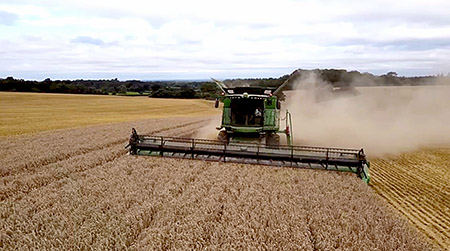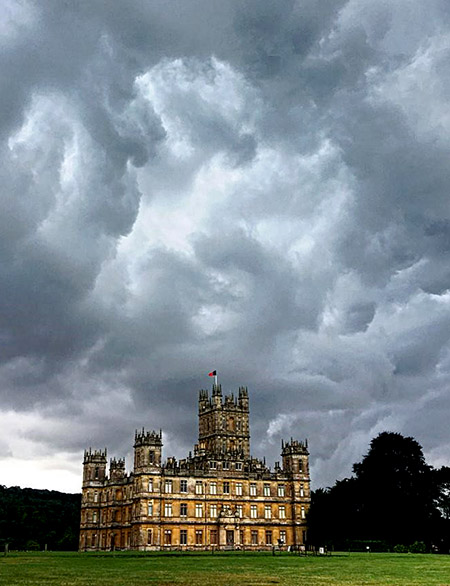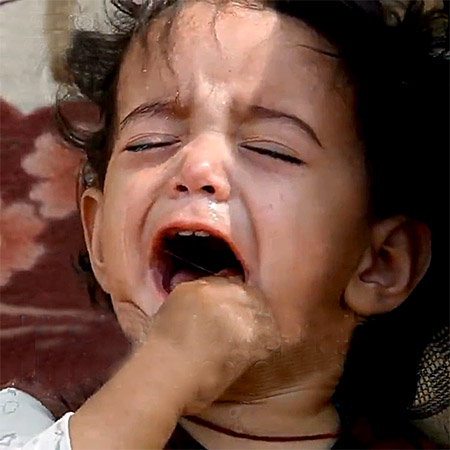
 As usual, this summer we are obsessed with the weather. Every time a week of sun is predicted, it promptly dissolves into cloud, mizzle and then short sharp bursts of rain. It is particularly key for the farm who, led by Simon the farm manager, are trying to harvest the oats, wheat and barley. The whole enterprise ends up happening in snatches of time.
As usual, this summer we are obsessed with the weather. Every time a week of sun is predicted, it promptly dissolves into cloud, mizzle and then short sharp bursts of rain. It is particularly key for the farm who, led by Simon the farm manager, are trying to harvest the oats, wheat and barley. The whole enterprise ends up happening in snatches of time.
In today’s world we keep an eye on the BBC weather, the Met Office, Metcheck plus a host of other platforms accessible through our phones. Often, each site gives wildly varying predictions so you end up scrolling through them all until you find one you are happy with and then end up just as disappointed when it proves unreliable.
For millennia before phones, we learnt to look for other signs of what the weather might do: scents in the air, cows lying down, the furling up of petals and the shape of the clouds in the sky. Our ancestors were more closely tuned to messages from nature and spent more time outside. They needed to gather as much information as they could as they had less immediate protection. Sadly, this year there have been precious few evenings with a clear red sky, and thus only a few high summer days, although each one has been precious.
Of course, in some parts of the world the challenges thrown by nature can be somewhat more dramatic than anything we see here in rather damp England: volcanic eruptions, extreme storms and killer heatwaves, all of which are happening around us this summer. It seems entirely inappropriate therefore to complain of the problems caused by too much rain and too little sunshine yet the longer-term effects of a ruined harvest can cause just as many serious issues as a sudden disaster. Very little of the wheat produced in this country so far this season has been of millable quality which will have implications for the food supply industry over the coming months. We have named everything in nature giving us the illusion that we are in charge but actually we are doing well if we can maintain something of a partnership with a force we have very little control over in reality.
 The human race spends an almost alarming amount of its time trying to work out what will come next. Your phone tries to tell you what you are writing before you’ve started with often farcical results. It is a brave person who sends off a text these days without double checking. Fortunes are made or lost on stock market predictions – in a way really just sophisticated gambling whilst for many this year’s game of choice is “where can I go on holiday, if at all?” as we try to second guess the latest path taken by both the virus and the politicians.
The human race spends an almost alarming amount of its time trying to work out what will come next. Your phone tries to tell you what you are writing before you’ve started with often farcical results. It is a brave person who sends off a text these days without double checking. Fortunes are made or lost on stock market predictions – in a way really just sophisticated gambling whilst for many this year’s game of choice is “where can I go on holiday, if at all?” as we try to second guess the latest path taken by both the virus and the politicians.
 Predicting how to win the lottery, what horse might win a race or what the future might hold is the less analytical side of this obsession whilst working out what customers might look for and what business trends can be founds is the more scientific end of the spectrum. Informed predictions can lead to establishing a strategy but there is still that element of chance which can be overturned by the unexpected.
Predicting how to win the lottery, what horse might win a race or what the future might hold is the less analytical side of this obsession whilst working out what customers might look for and what business trends can be founds is the more scientific end of the spectrum. Informed predictions can lead to establishing a strategy but there is still that element of chance which can be overturned by the unexpected.
Inaccurate predictions combined with poor information and too brief reflection have certainly played their part in the tragedy unfolding in Afghanistan at the moment. Undoubtedly many lessons will have to be learnt in terms of the analysis of information and the need for real knowledge of the history and geography of a people before the politicians sweep in to opine.
Understanding and a strategy based on real information combined with hard work generally gives you a good chance, over time, of achievement and a more orderly vision, culture and life. Short cuts in this sort of situation rarely lead to success, something that politicians often fail to remember. For the religious and political victims in Afghanistan, the flood victims in Germany and the people in Greece and France whose livelihoods have been destroyed by wildfires, the question now is if our predictions are so clearly very wrong, what do we then do? I hope we can listen and in human terms remember the tale of the good Samaritan.
often fail to remember. For the religious and political victims in Afghanistan, the flood victims in Germany and the people in Greece and France whose livelihoods have been destroyed by wildfires, the question now is if our predictions are so clearly very wrong, what do we then do? I hope we can listen and in human terms remember the tale of the good Samaritan.








 Instagram
Instagram
Greetings & Many Thanks
Your words warm my soul.
Sometimes, Hope is a strategy; when brave writing like yours exists, perhaps all is not lost.
Please stay well.
I have seen time and time again, Lady Carnarvon, how humans come to the aid of other humans, and I think the outpouring of help and heart will come to the aid of those suffering yet again. Humans are resilient (dare I say stubborn?); we may be knocked down, but with grit and determination, we will recover. Tragedy leaves a scar, but I like to think of it as a mark of winning a battle.
I enjoyed your thoughts in today’s blog post, and I wholeheartedly agree with your sentiments.
Best wishes for a wonderful week from across the Pond!
Amy
And you too – thank you
My heart is sore, my mind is overwhelmed.
So true and beautifully expressed in an erudite manner…. Thank you and bless you with love from Sheila
In Canada, we have flies that bite prior to a rainstorm, or the how high bees construct their hives to let us know just how much snow the buzzing forecasters see. In my culture, we believe that we are one with the land and water and should protect these precious resources for 7 generations that come after us. The things we take for granted today, have come at great expense to our environment. If we even took a glance at Traditional Ecological Knowledge, we may be able to prevent further irreversible environmental damage, if given the chance. That is my hope at least.
Good day Lady Carnarvon!
Dear Lady Carnarvon,
A most beautiful post of the tragic results of the current need for a “quick fix”, expedient action, and impatient decisions. Human suffering brought by human error. We must listen to the heart, the earth, and the sky with care or the tragedies will accelerate. Let us not lose even more connection. Haste makes waste is an understatement, but holds great truth.
May you and your loved ones continue to be safe, and thank you for your beautiful Monday posts. I always look forward to them!
Best regards,
Charlotte Merriam Cole
Thank you – patience is not easy to master but usually so worthwhile
Dear Lady Carnarvon,
Some things cannot be blamed on the weather, sadly and it would be helpful if we humans made a bit more effort to learn from our mistakes. There are many good and excellent human beings in the world, we just need to listen to them more and be accepting that we need to change and adapt fast. Controversial decisions shouldn’t be in the hands of individuals but in the hands of consensus, and dangerous and deadly activities stopped no matter what and where they are in the world. For those of us who don’t have the levels of influence to make big changes, every single act of kindness, compassion and understanding we make contributes to a better world and I hope we are heading that way.
Thank you for this week’s thought provoking blog.
Jane
Greetings again Lady Carnarvon,
What dramatic photos and another appropriate blog of what the world is facing during these challenging times. Agree with you that it is so sad that the global weather this year is having more disastrous effects then lovely and enjoyable days and evenings given record high temperatures, fires, quakes, tsunamis, hurricanes, powerful rains that create floods (two days ago an area here in the US in Tennessee had 17″ of rain fall in 24 hours and so many are missing, had died and lost their homes due to the rains), lightening storms, etc. Agree that the weather effect on agriculture can be devastating as well. Also agree that lessons will be learned by all who are elected in power to make changes in positive ways. Prayers going out that England’s end of summer and fall weather is more beautiful so that all of you can make the most of it on all levels and enjoy it as well!
It is such a pleasure to read your column. I learn so much from it. It is not all platitudes and fluff. You are right about the weather and our desire to gain not control, but a working relationship with the weather. We need to have a partnership with the weather, soil and air to produce what we need to live.
I read your book Almina, the real story behind Downton Abbey and loved it. I have bought 3 copies as gifts to friends. My good friend, Karyn Wendell is coming to visit you with her group from Cape Cod. She will be there for Christmas shopping the first week of December. I told Barbara Macchio (who is coming with Karyn) how I met you and you spoke with me in the tea room. It was a chance encounter, but it meant so much to me. Thank you for preserving what is good in the world. Lise
Thank you
Earnest prayer is a good place to begin.
Until we admit we can’t handle things, and place our faith in God, with a willingness to do things His way, we will be in despair!
Dear Lady Carnarvon,
That is the most intelligent, heartfelt, empathetic essay I have read for quite some time. I’m with you 100%. The allusion to the Good Samaritan was apt. Keep “casting your bread upon the watees”!
I am so sorry about the wheat. I well remember being in Sempringham about this time of year some 35 years ago, looking over wheatfields as far as the eye could see. The most beautiful wheat in the world is grown in England!
God Bless,
Your American (Loyalist heritage) follower,
Wayne Bean
I totally agree!
My dear Lady Carnarvon,
Thanku for yet another brilliant blog – OMG we are indeed at the mercy of the weather wherever we are……I was lucky enough to be taught how to read the weather by old Dorset Fishermen during my childhood, so now I spend most of my time watching what’s happening the sky, rather than the screen on my phone!
Have a wonderful Autumn my dear Ladyship, & I wish you all at Highclere a safe happy time – with as little rain as possible!
Yours
Caroline
A little sunshine is always good!
Dear Lady Carnarvon,
Your pictures, while always stunning, truly reflect your words today. The ones of storm clouds especially reflect the storms of climate change and political change.
For many different reasons, people have not respected nature. We did not know about greenhouse gases and what harm they were doing once we had automobiles.
People may have different opinions regarding climate change, but those who do not believe it will suffer the consequences of it as much as anyone who follows the science.
Thank you for the insightful post today.
The image of the castle with the darkening clouds swirling above is AWESOME. Gifted composition. Gifted timing. Gifted eye. Thank you for sharing your gifts.
The tragedies occurring around the world are beyond heartbreaking. The silver lining in these storms is that we all have the golden opportunity to help those whom are suffering. Giving whatever we can, (prayers, finances, physical labor), rendering any aid possible, whenever we can, to encourage, to ease suffering; serving them in any way possible, will bless all involved.
I agree – thank you
Just beautiful writing.
This is all so well stated. This has been a devastating year for so many, loss of life, loss of property and loss of any trust in leadership. We all are human, and no one can predict anything with surety, as we have learned these past months.
Perhaps we will learn to trust God more, as on this side of the quilt we can only see loose threads and a mess, whereas from the top he can see the beautiful pattern.
“Perhaps we will learn to trust God more, as on this side of the quilt we can only see loose threads and a mess, whereas from the top he can see the beautiful pattern.”
Well stated Bonnie!
Thank you for insightful thoughts on predictions. Unfortunately many predictions look bleak. But we cannot control many outcomes unless we control ourselves. The crises around the world and their repercussions are all relative to that area but could affect the world. Your point on the wheat field harvest is spot on that point. I pray your fields and other fields of the world, in their respective predicaments, will be successfully harvested for the benefit of mankind. Blessings for sunny days!
Lady Carnarvon lovely pictures and thank you for email did you have a nice weekend you and lord Carnarvon lovely to visit highcelere castle
Dear Lady Carnarvon
As usual your Blog hits the proper note for the week we have gone through. On my end it was Hurricane Henri.
Most Fortunately We on the lower New Jersey Coast were spared the winds but alas the Rain fell in Proverbial Buckets. I believe we have thus far had 3+ inches and the Rain is still falling from the heavens. The Weather reports were Dead On with their Predictions. The Level of my pond has risen to what appears 4 feet. But the house is spared as we are on a 10 foot rise.
Yes Listen To Predictions that is indeed the key words.
You are lucky your house is on a 10 foot rise!
Today’s post was a perfect example of one thoughtful person evoking other thoughtful people and the result being comfort for the mind and soul. Your weekly writings always start my week with reflection and appreciation. However, when your gift encourages others to really think about the craziness and challenges in our world, your gift is magnified by collective wisdom and insight being shared amongst your followers.
Thank you all!
Maggie Walden CT. USA
Hello Lady Carnarvon
Indeed, a difficult world and with a bit of common sense by all, Afghanistan can move forward to some form of stability.
As for the weather, well it is in the Thames Valley and with no wind, the rain lingers. I know I fish nearby. My thoughts are with those caught in floods in USA, that was unexpected.
Moving on, I will be at Highclere tomorrow and the weather forecast looks OK with a lot of sunshine. Perhaps an afternoon tea, outside, a possibility.
Hope to see you for a chat when you stop for a breather.
Carry on Highclere.
regards
Very nice article, wise words
Thank you for your timely blog. So many disasters! The lesson from the Good Samaritan is needed more than ever. May the Son come out to warm us all.
Lady Carnarvon,
This most appropriate post for this morning reminds me that there is always hope. More and more we learn about the devastation prompted by weather here in the US and abroad. The calamity and taking of lives in Afghanistan will not let up yet for some time. Worldwide aid will come to places in dire need, but we need the soothing voice of love and care during strife. You often provide this voice in your writing.
Reading your blog today is sobering, yet heartening. You would be a great ambassador for Great Britain.
Thank you for reminding us to love and care and always be good Samaritans.
Stay well and thank you for sharing. We give thanks that the world may be seeing a light at the end of the tunnel for keeping us safe from Covid.
Best to you and yours,
Martha
Thank you for your thoughtful, wise words today. You can take a theme, elaborate on it, and send a message that gets to others in a beautiful way without preaching. Today you hit upon universal themes that so many are concerned about. And your eye for choosing appropriate and gorgeous pictures! I know you inspire and also bring pleasure to many near and far with your weekly words. God bless…..
Lady Carnarvon,
In this time of uncertainty with weather and world events, the only unchangeable thing is the love of God. He will never change and His promises are always true. He is working in our lives for our good. That is what is carrying me through. Also, I don’t watch the news. I heard this the other day: “Believe the news or the truth.”
I have just hopped aboard the blog recently, having been binge-watching Downton Abbey on Netflix.
I have similar blog snippets on my FB page of our goings on in the countryside of Alabama. We too, have had a rather wet summer. We try to run a few trailer loads of square bale hay during the summer months for our horses for their winter feed when the pasture grass dries up. It has been quite a challenge finding dry days in succession for the farmer to cut and dry the hay, and then for us to get it and unload it at home without encountering some type of weather. I can’t even imagine trying to farm on a large scale. Tennessee was hit with tragic flooding recently. My heart hurts for the world and you are absolutely correct. What we need is more kindness.
Thank you for such a down-to-earth commentary today. The variety of challenges you mentioned as well as the 4th wave of COVID19-Delta that’s sweeping the USA has been awful.
I have written an essay on “The Bruised Soul”; people who are weary of all these events and deliberate divisions of populations. I won’t elaborate; this is your blog.
History has demonstrated that how leaders respond to disaster/challenges provides a path to the future success or failure.
We can only hope the leadership will arise to speak to the better spirits within the populace. The future depends upon establishing communities of service in support of kindness and equanimity. The Samaritan is to be admired; thank goodness for all who emulate that service.
Blessings on you & thank you for your message. It created a dollop of hope in my heart.
Thank you dear Lady Carnavon
Your words are beautiful and heartwarming
Dear Lady Carnarvon,
You speak about a very timely issue in this weeks blog. The weather has changed so much in recent years and unless the world’s politicians do something it will get much, much worse. You are wise
to see that even if there are not violent weather events in your country too much rain can cause
spoiled harvests and a disruption to the food chain. I agree that poor predictions can cause
terrible political turmoil too like the situation unfolding in Afghanistan. The trouble with
predictions is sometimes that the people who receive them don’t always heed them. I predict
that you will always be able to deal with whatever problems life throws you with grace and
good humour. I think we have to deal with realities as best we can and this blog has made me
think that we would be wise to listen to you in that regard. If only, Lady Carnarvon ,I could
find out how to win the lottery or some kind of fantastic sweepstakes!! Any predictions about
this??
Happy But Rainy Summer,
Ann Catherine Flood
The sun has come out today!
The times we are living in right now, certainly, make one stop and think about it all. I agree that this is the time for as much prayer as we can muster. It is clear that none of us mere mortals have a solution. As an old song says, “somebody bigger than you and I”. Thank you, Lady Carnarvon.
Fondly,
Sue Smith
Englewood, Florida
Dear Lady Carnarvon,
Sigh. There are some things we just cannot control. And there are those things we can, like covering up tomato plants before the hurricane winds arrive.
We cannot make an appointment to discuss solutions with the decision-makers who are now grappling with getting as many people as possible out of harms way.
Let us do what we can to spread truth and caring.
All Best,
Dear Lady Carnarvon
I know the feeling well of trying to get a crop off………showers and pull back……more trying to get it off…………more rain. We even took crops off in the middle of the night and the powerful lights on the tractors lit up the area like daylight. Next thing we knew other farmers close by were also bringing their crops in at night and it was great fun finding weary farmers yawning all over town all wishing to go home to bed! Our summer nights are very hot and have the lowest dew point so night time harvesting worked well for us. Good luck with your harvest, I hope the rain stays away long enough for you to finish.
We are all still in lock down in New South Wales and Canberra 🙁 and our town has Covid cases now thanks to some stupid tradesmen coming here from Sydney and bringing their germs with them 🙁 I find it incredible that some people just cannot understand simple instructions……..in English…….and continue to do stupid things. What part of “stay at home” do they not understand? Who tells other nincompoops that “Covid is just a hoax?”, what mushroom are they living under? Why do idiots keep telling us that “their freedom has been taken away by being locked down”??? I think we should take all of the above on a nice holiday to some remote island then we can watch them fade away !!!
I agree with you about Afghanistan. Billions of dollars spent, immeasurable lives lost, and the Taliban just walks through the country and takes over again. What an absolute disaster, what a life lost by those who only wanted freedom, the whole thing cost the world a lot and the Afghanis even more 🙁
Oh dear, I am complaining 🙁 but I am ever mindful that God has a plan for each of us and we should be thankful we wake up each morning, hear the birds sing, see the sunshine and hug our loved ones.
Best wishes to all our chatters and enjoy a wonderful day. Thank you Lady Carnarvon for your interesting insight to your life at Highclere and stay safe and well 🙂
Joy Roebig
Orange, Australia
I think we can all help make things better – but we do need to understand there is something not right!
Dear Lady Carnarvon:
Thank you for your timely,-written Monday blog. Beautiful lesson.
Until next week, may you be blessed with sunshine and Blue skies.
Perpetua Crawford
Thank you dear Lady Carnarvon, I am blessed by your writing and long for people all over the world to just love their neighbour. What a wonderful world that would be! ❤️
Lady Carnarvon,
I always modify my week according to the weather.
I don’t think we were prepared for all these events happening in the world. Our outlook on life has drastically changed. So we pray and meditate for the best outcome. My dear friend who left us this year, said: “,too many events..”
Sorry to hear your sad news.
Hello again Lady Carnarvon,
I had a question regarding an estate item. In Downton Abbey, there sits two vases on the fireplace mantle. They appear to be a deep blue in some pictures, but I’m not sure. Are they cobalt? They have gold trimmings on the handle, etc. My boyfriend enjoys collecting antique cobalt items and he was very interested in the history of your items.
There are various beautiful vases and it is often safer to leave them rather than move them for filming. it depends which room?
It is a room with teal wallpaper. There is a pinkish couch. A picture hangs between the vases – looks like four young people.
Dear Lady ..Your Ladyship..from America with love. These days the sad actions of people without concern for the future, for harvest or for love of others as the war in Afghanistan… leave a heavy heart for many. There are no fields of beautiful flowers in these torn countries…if only for a moment their children could have a peaceful walk on your fields to fill their hearts with internal peace… my message to you; thank you for tradition, your dedication and perseverance, you give us the gift of something magnificent to experience. I hope to take my Daughter Suri to dream for a day at your castle fields…From America…Florida. Much love… Laura Schaefer